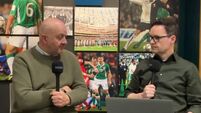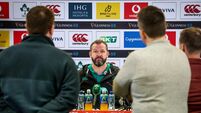The Gatland grudge: why Irish sacking was the making of the Wales boss

Warren Gatland gives a speech to his Ireland players. Picture: INPHO/Billy Stickland
IN the aftermath of Warren Gatland’s last run-in with Ireland a fortnight before the 2019 World Cup, an old sore festered into a public spat.
SIX NATIONS CHAMPIONSHIP
Your home for the latest news, views and analysis of this year's Six Nations Championship from our award winning sports team.
SIX NATIONS CHAMPIONSHIP
Your home for the latest news, views and analysis of this year's Six Nations Championship from our award winning sports team.














